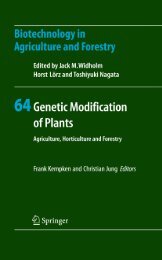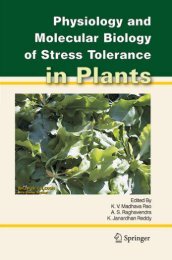Biofuels in Perspective
Biofuels in Perspective
Biofuels in Perspective
You also want an ePaper? Increase the reach of your titles
YUMPU automatically turns print PDFs into web optimized ePapers that Google loves.
Bio-Ethanol Development(s) <strong>in</strong> Brazil 71<br />
positive aspects, wages levels may be <strong>in</strong>sufficiently high to prevent poverty, 24 as can be<br />
seen from the <strong>in</strong>dicators presented <strong>in</strong> Table 4.4.<br />
The ma<strong>in</strong> problem regard<strong>in</strong>g sugarcane production is concerned with the work<strong>in</strong>g conditions<br />
dur<strong>in</strong>g manual cane harvest<strong>in</strong>g. Most of the direct jobs are for harvest<strong>in</strong>g; the workers<br />
are migrants who move to the areas of plantations due to lack of economic alternatives <strong>in</strong><br />
their native regions. At least <strong>in</strong> the state of São Paulo the tendency is to reduce the number<br />
of workers <strong>in</strong> this very tough activity, as mechanical harvest<strong>in</strong>g will be fully implemented<br />
up to 2017. A s<strong>in</strong>gle harvester can displace about 80 cane cutters and just some workers<br />
could be relocated to other functions. Thus, <strong>in</strong> order to avoid heavy unemployment, it<br />
is important to displace workers for mach<strong>in</strong>es dur<strong>in</strong>g the period of the expansion of the<br />
ethanol <strong>in</strong>dustry.<br />
4.7.6 Answer<strong>in</strong>g the Question about Susta<strong>in</strong>ability<br />
Dur<strong>in</strong>g more than 30 years of large-scale production of ethanol <strong>in</strong> Brazil results achieved<br />
regard<strong>in</strong>g susta<strong>in</strong>ability are remarkable, but it is clear that improvements can and must be<br />
reached. Consider<strong>in</strong>g the ma<strong>in</strong> pr<strong>in</strong>ciples of susta<strong>in</strong>able production described at the beg<strong>in</strong>n<strong>in</strong>g<br />
of this section, the ma<strong>in</strong> advantage of Brazilian production is regard<strong>in</strong>g reductions<br />
of GHG emissions. Results are well above the m<strong>in</strong>imum saves European countries tend<br />
to ask (30 % regard<strong>in</strong>g the emissions of a gasol<strong>in</strong>e vehicle), but can even be improved<br />
with, for <strong>in</strong>stance, phas<strong>in</strong>g-out of sugarcane burn<strong>in</strong>g <strong>in</strong> the field, enlargement of electricity<br />
production and reduction of diesel oil consumption <strong>in</strong> the agriculture.<br />
The most common questions rose about ethanol production <strong>in</strong> Brazil with concern<br />
to biodiversity protection <strong>in</strong> general and destruction of the Amazon forest <strong>in</strong> particular,<br />
besides concerns about work<strong>in</strong>g conditions dur<strong>in</strong>g manual harvest<strong>in</strong>g. Both issues should<br />
be properly addressed by Brazilian society despite the target of export<strong>in</strong>g ethanol.<br />
Brazil has so far presented modest results avoid<strong>in</strong>g the deforestation of ra<strong>in</strong> forests (e.g.<br />
accord<strong>in</strong>g to the Brazilian M<strong>in</strong>istry for the Environment, 35 the deforestation of the Amazon<br />
forest was reduced from 2.7 Mha/year to 1.0 Mha/year <strong>in</strong> four years), but it has not yet<br />
been proved that sugarcane expansion is directly or <strong>in</strong>directly responsible for deforestation.<br />
Plantations of soybeans and pastures are push<strong>in</strong>g the borders of the Amazon forest and<br />
environmentalists blame sugarcane expansion for <strong>in</strong>duc<strong>in</strong>g this process. However, the issue<br />
is not to prove if this argument is right or wrong, but to stop deforestation as fast as possible.<br />
And even the sugarcane production <strong>in</strong> the state of São Paulo, thousands of kilometers far<br />
from the Amazon, should be improved <strong>in</strong> order to reduce the effects of monoculture and<br />
to protect biodiversity.<br />
Regard<strong>in</strong>g the liv<strong>in</strong>g conditions of workers, it is not reasonable to conceive the preservation<br />
of manual harvest<strong>in</strong>g as a way to keep the jobs of hundred of thousands of people.<br />
A modern country needs to create better job opportunities and to improve life quality for<br />
all citizens, and ma<strong>in</strong>ly the poorest. In addition, modernization of ethanol production is a<br />
vital condition to make it a real commodity.<br />
Ethanol production <strong>in</strong> Brazil is heterogeneous from the po<strong>in</strong>t of view of susta<strong>in</strong>ability.<br />
Part of the production is <strong>in</strong> condition to fulfill most of the pr<strong>in</strong>ciples under discussion<br />
<strong>in</strong> Europe, but part of the production still presents serious problems. In a general sense,<br />
production <strong>in</strong> the state of São Paulo is more close to fulfill<strong>in</strong>g the susta<strong>in</strong>ability standards








